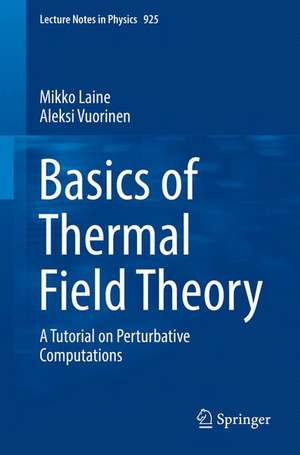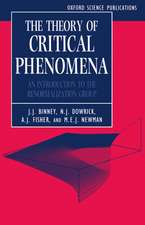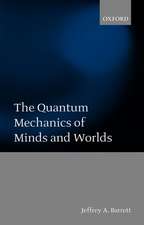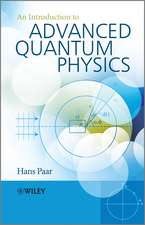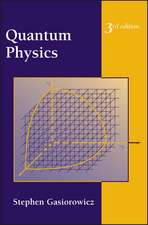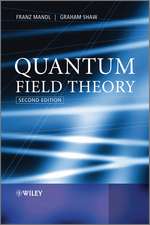Basics of Thermal Field Theory: A Tutorial on Perturbative Computations: Lecture Notes in Physics, cartea 925
Autor Mikko Laine, Aleksi Vuorinenen Limba Engleză Paperback – 12 iun 2016
The book serves as a self-contained textbook on relativistic thermal field theory for undergraduate and graduate students of theoretical high-energy physics.
Din seria Lecture Notes in Physics
- 19%
 Preț: 423.99 lei
Preț: 423.99 lei - 17%
 Preț: 360.73 lei
Preț: 360.73 lei -
 Preț: 429.22 lei
Preț: 429.22 lei - 17%
 Preț: 427.62 lei
Preț: 427.62 lei - 17%
 Preț: 460.25 lei
Preț: 460.25 lei -
 Preț: 427.96 lei
Preț: 427.96 lei -
 Preț: 481.93 lei
Preț: 481.93 lei - 17%
 Preț: 494.64 lei
Preț: 494.64 lei -
 Preț: 281.90 lei
Preț: 281.90 lei - 17%
 Preț: 493.20 lei
Preț: 493.20 lei - 17%
 Preț: 426.72 lei
Preț: 426.72 lei -
 Preț: 365.15 lei
Preț: 365.15 lei -
 Preț: 374.52 lei
Preț: 374.52 lei -
 Preț: 407.98 lei
Preț: 407.98 lei - 20%
 Preț: 428.12 lei
Preț: 428.12 lei -
 Preț: 263.30 lei
Preț: 263.30 lei - 15%
 Preț: 593.73 lei
Preț: 593.73 lei - 15%
 Preț: 528.13 lei
Preț: 528.13 lei -
 Preț: 493.12 lei
Preț: 493.12 lei - 17%
 Preț: 425.68 lei
Preț: 425.68 lei -
 Preț: 280.65 lei
Preț: 280.65 lei -
 Preț: 163.41 lei
Preț: 163.41 lei - 18%
 Preț: 726.59 lei
Preț: 726.59 lei -
 Preț: 394.84 lei
Preț: 394.84 lei - 15%
 Preț: 709.63 lei
Preț: 709.63 lei - 15%
 Preț: 623.90 lei
Preț: 623.90 lei - 20%
 Preț: 476.91 lei
Preț: 476.91 lei - 15%
 Preț: 428.05 lei
Preț: 428.05 lei -
 Preț: 342.78 lei
Preț: 342.78 lei - 18%
 Preț: 851.93 lei
Preț: 851.93 lei -
 Preț: 346.61 lei
Preț: 346.61 lei -
 Preț: 391.57 lei
Preț: 391.57 lei - 15%
 Preț: 633.16 lei
Preț: 633.16 lei -
 Preț: 451.71 lei
Preț: 451.71 lei - 5%
 Preț: 1497.80 lei
Preț: 1497.80 lei -
 Preț: 374.85 lei
Preț: 374.85 lei -
 Preț: 380.07 lei
Preț: 380.07 lei - 15%
 Preț: 516.14 lei
Preț: 516.14 lei - 15%
 Preț: 583.78 lei
Preț: 583.78 lei - 15%
 Preț: 508.60 lei
Preț: 508.60 lei -
 Preț: 469.71 lei
Preț: 469.71 lei -
 Preț: 388.90 lei
Preț: 388.90 lei - 15%
 Preț: 500.24 lei
Preț: 500.24 lei -
 Preț: 386.52 lei
Preț: 386.52 lei - 15%
 Preț: 472.88 lei
Preț: 472.88 lei -
 Preț: 424.27 lei
Preț: 424.27 lei -
 Preț: 380.07 lei
Preț: 380.07 lei - 15%
 Preț: 500.01 lei
Preț: 500.01 lei
Preț: 628.24 lei
Nou
Puncte Express: 942
Preț estimativ în valută:
120.21€ • 125.85$ • 99.47£
120.21€ • 125.85$ • 99.47£
Carte tipărită la comandă
Livrare economică 05-19 aprilie
Preluare comenzi: 021 569.72.76
Specificații
ISBN-13: 9783319319322
ISBN-10: 3319319329
Pagini: 280
Ilustrații: XIV, 281 p. 61 illus., 10 illus. in color.
Dimensiuni: 155 x 235 x 16 mm
Greutate: 4.51 kg
Ediția:1st ed. 2016
Editura: Springer International Publishing
Colecția Springer
Seria Lecture Notes in Physics
Locul publicării:Cham, Switzerland
ISBN-10: 3319319329
Pagini: 280
Ilustrații: XIV, 281 p. 61 illus., 10 illus. in color.
Dimensiuni: 155 x 235 x 16 mm
Greutate: 4.51 kg
Ediția:1st ed. 2016
Editura: Springer International Publishing
Colecția Springer
Seria Lecture Notes in Physics
Locul publicării:Cham, Switzerland
Cuprins
Preface.- Notation.- General Outline.- Quantum Mechanics.- Free Scalar Fields.-Interacting Scalar Fields.- Fermions.- Gauge Fields.- Low-Energy Effective Field Theories.- Finite Density.- Real-Time Observables.- Applications.- Index.
Recenzii
“It gives a very good introduction to perturbative finite-temperature quantum field theory. In particular, the derivations are very detailed, explaining carefully potential pitfalls other texts may just glance over. As such the book is also suitable for self-studies for researchers interested in thermal quantum field theory. … In summary, this book closes a gap between standard master-level university courses on (non-thermal) quantum field theory and current research in perturbative finite-temperature quantum field theory.” (Stefan Weinzierl, zbMATH 1356.81007, 2017)
Notă biografică
After obtaining a PhD in theoretical physics from the University of Helsinki, in 1994, Mikko Laine held postdoctoral positions at the University of Heidelberg, 1995 - 1997, and at the Theory Division at CERN, 1997 - 2003. For 2003 - 2012 he was a professor of theoretical physics at the University of Bielefeld; since 2012 he is a professor of theoretical physics at the University of Bern.
Aleksi Vuorinen obtained his PhD in theoretical physics from the University of Helsinki in 2004, and thereafter worked as a postdoctoral researcher at the University of Washington, 2004-2007, the Technical University of Vienna, 2007, as well as the Theory Division of CERN, 2008-2009. From 2009 to 2013, he headed a Sofja Kovalevskaja research group at the University of Bielefeld, after which he returned to Helsinki, where he currently works as a research group leader at the Helsinki Institute of Physics.
Aleksi Vuorinen obtained his PhD in theoretical physics from the University of Helsinki in 2004, and thereafter worked as a postdoctoral researcher at the University of Washington, 2004-2007, the Technical University of Vienna, 2007, as well as the Theory Division of CERN, 2008-2009. From 2009 to 2013, he headed a Sofja Kovalevskaja research group at the University of Bielefeld, after which he returned to Helsinki, where he currently works as a research group leader at the Helsinki Institute of Physics.
Textul de pe ultima copertă
This book presents thermal field theory techniques, which can be applied in both cosmology and the theoretical description of the QCD plasma generated in heavy-ion collision experiments. It focuses on gauge interactions (whether weak or strong), which are essential in both contexts. As well as the many differences in the physics questions posed and in the microscopic forces playing a central role, the authors also explain the similarities and the techniques, such as the resummations, that are needed for developing a formally consistent perturbative expansion. The formalism is developed step by step, starting from quantum mechanics; introducing scalar, fermionic and gauge fields; describing the issues of infrared divergences; resummations and effective field theories; and incorporating systems with finite chemical potentials. With this machinery in place, the important class of real-time (dynamic) observables is treated in some detail. This is followed by an overview of a numberof applications, ranging from the study of phase transitions and particle production rate computations, to the concept of transport and damping coefficients that play a ubiquitous role in current developments.
The book serves as a self-contained textbook on relativistic thermal field theory for undergraduate and graduate students of theoretical high-energy physics.
The book serves as a self-contained textbook on relativistic thermal field theory for undergraduate and graduate students of theoretical high-energy physics.
Caracteristici
Concrete and self-contained style suitable for classroom or self-study, with the material divided into chapters that are directly usable as single lessons Introduces the basic formalism, concepts, and applications of thermal field theory in the current era of precision cosmology and heavy-ion physics Offers a detailed exposition of the derivations of the basic equations Illustrates the developed formalism with selected examples from contemporary research in cosmology and heavy ion physics
